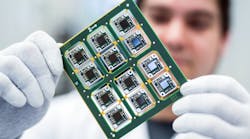Globalfoundries, one of the biggest chip manufacturers in the U.S., and TSMC, the world's largest contract chip maker, agreed on Monday to dismiss all patent litigation between them, ending an escalating battle that threatened to ensnare Apple, Google, Qualcomm and other key customers. The companies said in a joint statement that they also agreed to a broad cross-licensing deal to continue selling to customers instead of fighting in court.
TSMC and Globalfoundries—No. 1 and No. 3 in the foundry market, respectively— agreed to withdraw all of the lawsuits launched against each other in recent months as well as any litigation involving their customers. Under the terms of the deal, the companies will cross-license each other's patents as well as patents filed in the next decade. TSMC and Globalfoundries hold tens of thousands of patents between them.
Globalfoundries, which has struggled to gain foundry market share in recent years, launched a series of suits against TSMC in August, alleging patent infringement. The company was seeking to block chips based on its patents from entering the U.S. and Germany. TSMC, trying to protect its 50% share of the $60 billion market, sued Globalfoundries in retaliation, also alleging the illegal use of its chip manufacturing patents.
"The semiconductor industry has always been highly competitive, driving the players to pursue innovation," Sylvia Fang, general counsel at TSMC, said in a statement. "The resolution is a positive development that keeps our focus on advancing the needs of our customers for technologies that will continue to bring innovation to life, enabling the entire semiconductor industry to thrive and prosper." (TSMC had initially dismissed the litigation as "baseless.")
"We are pleased to have quickly reached this settlement that acknowledges the strength of our respective intellectual property," Tom Caulfield, chief executive of Globalfoundries, said in a statement on Monday. "Today's announcement enables both of our companies to focus on innovation and better serve our clients around the world." (The company a month ago argued TSMC uses "its dominant market position to exert pressure on smaller competitors.")
The legal wrestling could have had harsh consequences for the global electronics market. Globalfoundries named chip designers Nvidia, Broadcom, Qualcomm, Mediatek, Xilinx and Apple in its suits. The Silicon Valley company also targeted indirect customers that buy chips made by TSMC and use them in smartphones, laptops, networking gear and other gadgets. Those defendants included Cisco, Motorola, Lenovo and Google.
TSMC accused Globalfoundries of running afoul of 25 patents, demanding compensation and a ban on product sales. Globalfoundries was also looking to be reimbursed for the illegal use of 16 patents asserted in its complaints. Globalfoundries said TSMC made more than $10 billion selling chips based on the patents in question. It launched the legal assault against TSMC to defend its investment in the U.S amid production shifts to China.
The companies declined to detail the financial terms of the settlement.

